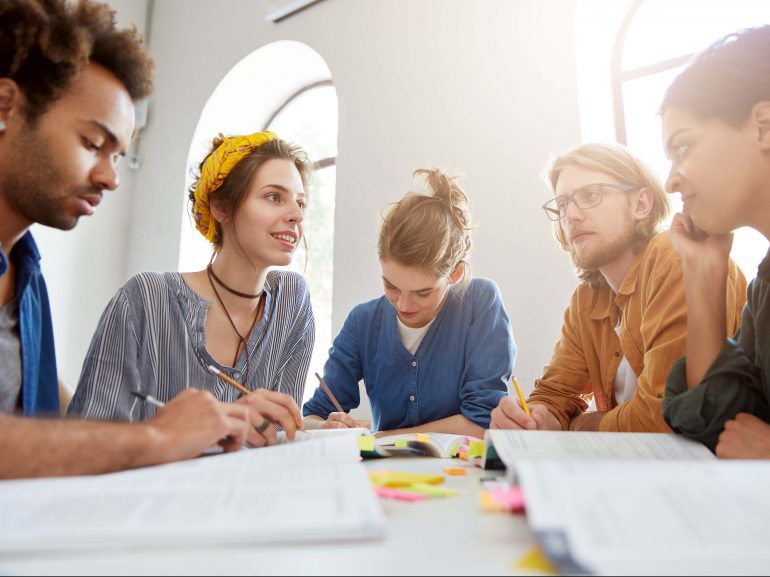Group learning is an increasingly popular approach to assessment; it provides opportunities for collaborative and authentic learning experiences. However, it is not without controversy; teachers report that group tasks have the potential to provide rich, meaningful and transformative learning about course content and teamwork but can be fraught with challenges of equity and engagement. Students often report that group tasks can be overly onerous for the allocated assessment weighting and consequently they look for ways to minimise the workload or rely on others to carry them, missing the collaborative learning experience.
Prompted by the need to support the delivery of group work within the faculty, FMH Education Designers conducted field research to understand current practice. One of the outcomes was the development of some Canvas Group Work Teaching and Learning Resources that can be added to your unit site to support your next group assessment.
Why group tasks?
Group tasks and assessments are typically chosen because they are an authentic learning experience; they reflect real work practice. Today, learning and working effectively as part of a team is a common experience that contributes to developing an invaluable skill set. Students will continue to develop and refine these skills throughout their academic and working life. We should reframe group work in terms of teamwork and peer review as peer feedback.
Group projects should be among the most valuable and rewarding learning experiences. However, they can also be some of the most frustrating experiences for some students;
it is important to take time to consider our role as educators in contributing to positive experiences and successful learning outcomes when designing and implementing group work for our students.
We recommend supporting group work by using the following strategies:
Before: Designing Group Tasks
- Review the unit learning outcomes assessed by the task. Identify if teamwork, collaboration, and communication are reflected in the learning outcomes. If these capabilities are not reflected in the learning outcomes, then it may be worth considering if a team task is the best assessment approach. If they are important skills and qualities, should they be added to the learning outcomes for the future?
- Consider the question: are you expecting students to cooperate to complete the task or are you seeking collaboration? Being an effective team member means contributing to good team culture, building rapport, communicating clearly, and building trust. We want to avoid situations where students work together but permit some team members to overstep their role or underperform – this can often lead to feelings of dissatisfaction and that certain team members deserve more or fewer marks.
- Consider your group allocation strategy in terms of what stage students are at and what teamwork experience they have previously had – e.g., are they first-year undergraduates, in their final year or are they postgraduate students, possibly with work experience?
- Be aware of what the university’s Assessment Policy says about group work and what this means for your teaching practice/responsibilities. For example, the Learning and Teaching Procedures 2016 states “an LMS website must contain…any relevant expectations relating to group work” and the Assessment Procedures Policy 2011 states “feedback on student work, either individually or in a group, should be sufficiently detailed to be a useful identification of strengths and areas for improvement”. So, if you have a group task in your unit you are expected to teach it (including providing resources to support group work on your Canvas site) and provide feedback to students (but you don’t have to allocate marks to the reflection or peer feedback).
- Consider UDL (Universal Design for Learning) principles in your group task design. For example, does the task provide for multiple means of action and expression, can students contribute based on their strengths or are you expecting all students will contribute in the same way?
Beginning: launching the task
- Start with a discussion about what good teamwork looks like. Our Canvas Group Work resources include an activity to support this conversation.
- Get team members to create a teamwork agreement before they begin. Encourage this to be a dynamic document to be revisited and revised during the process as needed.
- Provide the discipline context for group work – explain how students can conceptualise this experience as contributing to the development of valuable skills for their future.
- Explain the responsibilities students have for managing the process and the interactions and when and how you can provide guidance and support for them to resolve hurdles (but not necessarily resolve issues for them).
During: monitoring progress
- Check-in with groups to see if milestones are being achieved, ask them to reflect on both progress with the task and teamwork. This can be done face to face or can also be done as a quick survey to pick up students who may be out of their depth but unsure about how to speak up.
- Include a digital check-in from the teacher and consider an interim, intra-team check-in as a means of prompting students to reflect on their team agreement and their teamwork, collaboration, and communication skills during the task.
- Keep the focus on team troubleshooting and resolving their own challenges.
After: how to close the loop for students
- After the project is delivered, run a peer feedback task, either one that includes a reflection or is followed by a reflection task. You do not need to collect marks on this task. The purpose of peer review is to provide feedback. Its purpose is not to gather marks. A reflection task can be individual or completed as a team. It could ask students to write a small piece about what happened, and how to be a better team member next time.
- Provide opportunities to students who need to debrief their peer feedback.
With lifelong learning in mind and the transferable nature of teamwork skills, it is important to provide opportunities to consolidate and there are lots of ways you can run activities that close the loop. Peer feedback and reflection are an important part of learning in a group setting and ideally should be competency-based and refer to the expectations you set up the at the commencement of the group activity. If students made a team agreement, you could ask them to provide feedback to each other based on their own expectations. You can create a peer review assignment in Canvas asking students to write into the rubric to provide feedback to team members or choose from our menu of other approaches to peer feedback and reflection.
Keep in mind that contribution to teamwork is not necessarily a measurement of how much a person spoke or wrote but a contribution to the team culture, to team cohesion, team responsibility, to building rapport and trust, to being flexible, and to behaving professionally.
In some units, the group mark is moderated by peer feedback. This approach is typically chosen to induce students to engage equitably. However, it can be argued that moderating the team mark is counter to the idea that team members share collective responsibility for the group process and the group product. Think about the message it sends students. This approach often leads to students gaming the process and providing false peer feedback and it doesn’t seem to reduce complaints.
Group work involves collaboration as a team to achieve a group outcome that all team members benefit from. Like when the netball team wins 36 to 24, the winning team members all achieved the 36 points; we don’t attribute more or fewer points to individual team members based on contribution. We understand that the players worked as a team and contributed according to their role.
It is recommended that moderating group marks based on peer feedback should be done with caution and preferably only in the early years of a degree; as students progress and learn to manage teamwork in preparation for professional practice, they should be marked as a team.
Ultimately, we want students to learn through undertaking authentic tasks and having a rewarding and stimulating team experience. By providing students with a reflection task at the end of the process we have an opportunity to have students reflect on what they learnt from both the content of the task and about their collaboration and communication skills that they can take into their next group learning or workplace experience.
What to know more?
We now have some Canvas Group Work Teaching and Learning Resources that can be customised and added to your Canvas site. The teaching resources are designed to support you to implement effective and efficient group learning. There are also student resources providing tools and processes to guide teamwork including an introductory activity and a team agreement template.
Contact Education Innovation for a 1:1 Education Design Consultation to discuss group assessments and the Canvas Group Work resources available to support your group task. If you are in the Faculty of Medicine and Health, contact the FMH Education Design & Innovation Team directly.





